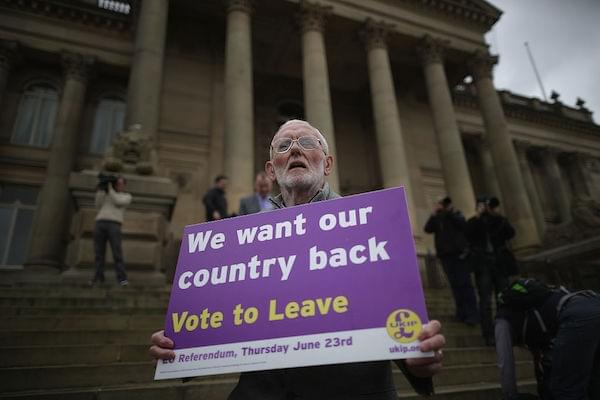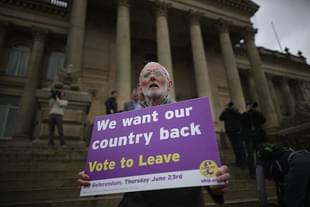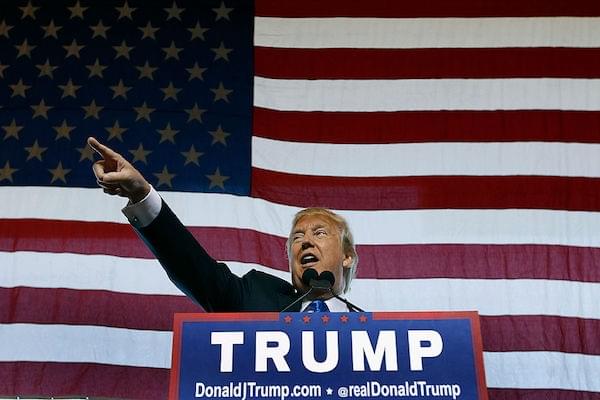World
Is This Globalisation’s Tipping Point?
Sriram Balasubramanian
Jul 24, 2016, 05:37 PM | Updated 05:37 PM IST
Save & read from anywhere!
Bookmark stories for easy access on any device or the Swarajya app.


The coronation of Donald Trump at the Republican convention was vigorous and controversial in equal measure. The arrival of Trump in the American political scene and recent events plaguing the world including Brexit seems to indicate one thing clearly—that we are at a tipping point.
In an era where the anti-establishment sentiment is at its highest, the role of political ideology is almost laid off—economic disparities is the driving force for instant change. The battle between the one percent and the 99 percent is a global phenomenon and the era of globalisation seems to be tipping downwards indeed.
According to this Atlantic piece Trump’s supporters are mostly from the following three- a. male white voters, b. uninformed white voter, c. the voter who has an intrinsic resentment towards the establishment. All these sections are driven by one particular common thread—they are all economically marginalised sections. There is no backlash here from the Christian voter feeling religious ostracism—if that was the case they would have gone for the standard Republican candidates.
Economics has become the primary focal point of their grouse against the establishment and Trump seems to be the only man who has projected a macho vision of saving America from the rest of the world. While other factors such as immigration, race and even religion have had their space in the campaign—the fundamental point has been the economic demotion of the American middle class, in essence the average white American who is either in the Mid-West or rural hinterlands of America.

Needless to say, the analysis leading up to Brexit is not very different. While immigration was projected as the central issue of the Brexit campaign, it is just one part of a greater issue -unemployment of the local population. Growing inequality has pulled down large sections of the middle class in the UK and this has allowed the politicians to use immigration as a tool to put the blame on the immigrants.
According to an analysis on the Brexit vote, across the 20 authorities where support for leaving the EU was strongest, only 16 percent of the voters have a degree, only 23 percent are professional and less than 5 percent are non-white. Also nearly 20 percent are pensioners with a medium income of 1800 pounds. It is primarily the working class people in counties such as Barnsley, Mansfield, Welsh towns like Merthyr Tydfil , fading coastal towns such as Blackpool, Great Yarmouth and Castle Point, or blue-collar but aspirational places like Basildon, Havering and Thurrock that voted for Brexit in large numbers.
It’s very apparent from this information that the Brexit vote chiefly had nothing to do with EU, it became a vent for the frustration of the hundreds of middle class workers who were feeling economically marginalised. The EU and immigration happened to be the justification to this frustration. As such, it’s the economics and income disparities that is written all over the Brexit vote if one takes a detailed analysis of the vote.
This trend is apparent across many countries in the world. The middle class which has been besieged by inequality wants rapid change and the perils of globalisation are taking an unenviable turn. Massive immigration have made local populations feel secluded and local cultures forsaken. In addition, the pervasive nature of globalisation has created a world which is unipolar and thin on diversity. The solution to all this, is to look at revamping the globalisation model and making it more customised towards local needs.
While global trade is an important aspect, it cannot supplant the local needs of the population. A one-size fits all model is not working—period. As mentioned in the World Bank report in 2008 , the world needs to look beyond the one-size fit all model and device customized economic models for individual countries with certain basic parameters being kept common among countries at large. An example of this is the gold monetisation scheme in India. Despite its rather lacklustre take off, it is a classic example of devising policies that suit the local strengths and cultural ethos that define economics.
The approach to a global model needs to stem from local strengths and ideas and a bottom-up economic approach needs to be implemented rather than a top-down approach. These policies would be perhaps one of the few ways to sustain equity in economic outcomes and lessen inequality at a local level. Only if inequality at a local level can be addressed, can the desire for constant change can be thought of.
It’s time to move beyond the obsession with globalisation and its lectures on how every country must be developed. Each country needs to have its own customised economic models pertaining to their own cultural and socio-economic agenda. The goal for governments should not only GDP centric; it has to be equity centric and it has to encompass the broader aspirational and cultural narrative of that particular region. Unless this sentiment is addressed, it will be tough to grasp the emergence of Trump, Brexit or other changes that the world will foresee in the years ahead.
Sriram Balasubramanian is a writer, journalist and economist. He tweets at @Sriram316.





